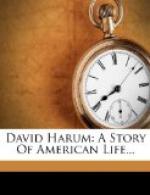tentative advances had been made to him, and Mr. Euston
had presented him to a few of the people in his flock;
but beyond the point of mere politeness he had made
no response, mainly from indifference, but to a degree
because of a suspicion that his connection with Mr.
Harum would not, to say the least, enhance his position
in the minds of certain of the people of Homeville.
As has been intimated, it seemed at the outset of
his career in the village as if there had been a combination
of circumstance and effort to put him on his guard,
and, indeed, rather to prejudice him against his employer;
and Mr. Harum, as it now appeared to our friend, had
on one or two occasions laid himself open to misjudgment,
if no more. No allusion had ever been made to
the episode of the counterfeit money by either his
employer or himself, and it was not till months afterward
that the subject was brought up by Mr. Richard Larrabee,
who sauntered into the bank one morning. Finding
no one there but John, he leaned over the counter
on his elbows, and, twisting one leg about the other
in a restful attitude, proceeded to open up a conversation
upon various topics of interest to his mind. Dick
was Mr. Harum’s confidential henchman and factotum,
although not regularly so employed. His chief
object in life was apparently to get as much amusement
as possible out of that experience, and he was quite
unhampered by over-nice notions of delicacy or bashfulness.
But, withal, Mr. Larrabee was a very honest and loyal
person, strong in his likes and dislikes, devoted
to David, for whom he had the greatest admiration,
and he had taken a fancy to our friend, stoutly maintaining
that he “wa’n’t no more stuck-up
’n you be,” only, as he remarked to Bill
Perkins, “he hain’t had the advantigis
of your bringin’ up.”
After some preliminary talk—“Say,”
he said to John, “got stuck with any more countyfit
money lately?”
John’s face reddened a little and Dick laughed.
“The old man told me about it,” he said.
“Say, you’d ought to done as he told ye
to. You’d ‘a’ saved fifteen
dollars,” Dick declared, looking at our friend
with an expression of the utmost amusement.
“I don’t quite understand,” said
John rather stiffly.
“Didn’t he tell ye to charge ’em
up to the bank, an’ let him take ’em?”
asked Dick.
“Well?” said John shortly.
“Oh, yes, I know,” said Mr. Larrabee.
“He said sumpthin’ to make you think he
was goin’ to pass ’em out, an’ you
didn’t give him no show to explain, but jest
marched into the back room an’ stuck ’em
onto the fire. Ho, ho, ho, ho! He told me
all about it,” cried Dick. “Say,”
he declared, “I dunno ‘s I ever see the
old man more kind o’ womble-cropped over anythin’.
Why, he wouldn’t no more ‘a’ passed
them bills ’n he’d ‘a’ cut
his hand off. He, he, he, he! He was jest
ticklin’ your heels a little,” said Mr.
Larrabee, “to see if you’d kick, an’,”
chuckled the speaker, “you surely did.”




